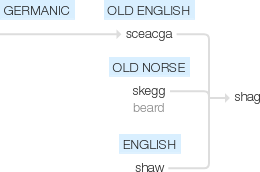Shag
late Old English sceacga ‘rough matted hair’, of Germanic origin; related to Old Norse skegg ‘beard’ and shaw2.
wiktionary
From Middle English *schagge, from Old English sċeacga(“hair, wool”), from Proto-Germanic *skaggô, *skaggiją(“projection, bristly hair, stem”), Proto-Germanic *skag-(“to emerge, stick out, protrude”), from Proto-Indo-European *(s)kek-, *(s)keg-(“to jump, move, hurry”). Akin to Old Norse skegg(“beard”) (compare Danish skæg, Norwegian skjegg, Swedish skägg).
Perhaps a derivative of Etymology 1, above, with reference to the bird's shaggy crest.
From Middle English schaggen, a variant of Middle English schoggen(“to shake; shake off; tremble”), of uncertain origin. Perhaps a byform of Middle English schokken(“to shake; move rapidly”), related to Middle Low German schokken(“to shake; tremble”). Alternatively, perhaps ultimately from Proto-Germanic *skakkōną(“to shake”), specifically continuing a post-Proto-Germanic variant *skagg-, where the non-singular stem *skag- caused the analogical replacement of the stem-final voiceless geminate consonants with voiced geminates, which was then leveled throughout the paradigm.
Blend of shower(“bridal shower”) + stag(“bachelor party”).
Etymology unknown
etymonline
shag (n.)
1590s, "cloth having a velvet nap on one side," perhaps from Old English sceacga "rough matted hair or wool," from Proto-Germanic *skagjan (source also of Old Norse skegg, Swedish skägg "beard"), perhaps related to Old High German scahho "promontory," Old Norse skagi "a cape, headland," with a connecting sense of "jutting out, projecting." But the word appears to be missing in Middle English. Of tobacco, "cut in fine shreds," it is recorded from 1789; of carpets, rugs, etc., from 1946.
shag (v.1)
"copulate with," 1788, probably from obsolete verb shag (late 14c.) "to shake, waggle," which probably is connected to shake (v.).
And þe boot, amydde þe water, was shaggid. [Wyclif]
Compare shake it in U.S. blues slang from 1920s, ostensibly with reference to dancing. But compare shag (v.), used from 1610s in a sense "to roughen or make shaggy." Also the name of a dance popular in U.S. 1930s and '40s. Related: Shagged; shagging.
shag (v.2)
in baseball, "to go after and catch" (fly balls), by 1913, of uncertain origin. Century Dictionary has it as a secondary sense of a shag (v.) "to rove about as a stroller or beggar" (1851), which is perhaps from shack (n.) "disreputable fellow" (1680s), short for shake-rag, an old term for a beggar.
